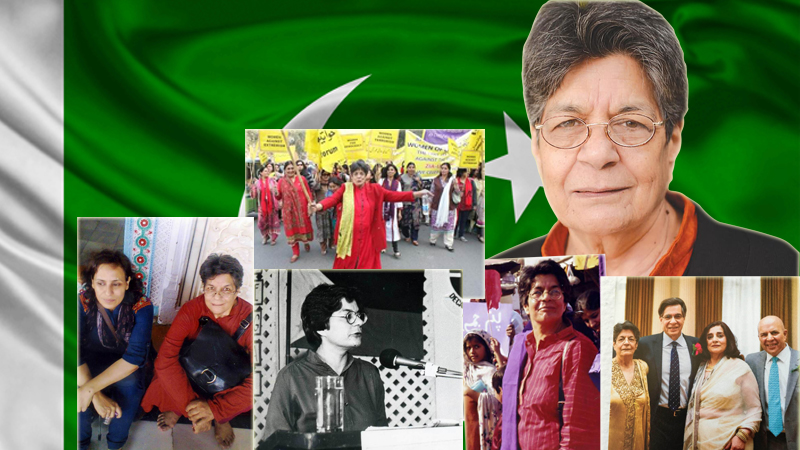 Tell us about your foray into the field of activism. How did it all begin for you?
Tell us about your foray into the field of activism. How did it all begin for you?
All my life, I had been propelled to counter challenges. Wherever something was going wrong, I had been attracted towards rectifying it. I remember, during Ayub Khan’s regime, I was involved in several protests, for which my parents had also warned me to face the consequences of my actions. As it turned out, I was expelled from my college Home Economics. Later, when my family shifted to the United States, I also got involved in several movements over there and remained very active on that front. While abroad, I was doing odd jobs and got associated with the trade unions, the movements for the poor, etc. However, I came back, determined to take my active stance against tyranny in my home country.
Tell us about how the Applied Socio-Economic Research resource centre and the Institute of Women’s Studies Lahore came into being.
During the time I was teaching at the Quaid-e-Azam University in Islamabad, I did not agree with many policies of their vice chancellor who was very pro Pakistan People’s Party. I got expelled from QAU and began my own course of studies about rural poverty. In pursuance of that, I lived in villages for three year, which was a very important turning point in my career. I felt that university studies did not quite connect with students. So I started toying with a different kind of education. The day after I got back from abroad after finishing my PhD, the Women’s Action Forum (WAF) formed in Pakistan. I wanted to begin and initiate something similar but could not get the foundation registered. I began visiting India trying to start people-to-people contact and hence began these movements.
Why did you decide to move back to Pakistan?
Although I was involved in many movements in the United States, I wanted to give back to my country. If my country had problems, I was a part of those problems. I didn’t have to give anything back to the US, but had to do it for Pakistan, where I connect. And doing that energises me.
‘I want peace with India and the South Asian region’
How much do you think Pakistani society has empowered women? What are some of the biggest challenges facing Pakistani women?
Pakistani women have achieved a lot at one level when it comes to taking up important positions in the parliament and senior positions at leading firms, etc. Women like Lala Rukh, Asma Jahangir and Madeeha Gauhar who founded the WAF broke norms and were dynamic in their approach. There are girls everyday who struggle and fight at their home front in the rural areas, to go to schools and to attain education. Today, women can do whatever they want but our generation had to struggle. Their used to be one landline back in our days, today every girl has a mobile phone. However, I feel that violence and misogyny is on the rise.
Do you think the new government will uphold or implement women’s rights effectively and efficiently?
Imran Khan doesn’t even understand women’s rights. He only understands women’s welfare and there is a difference. He says he’ll safeguard rights of widows and orphans but never mentioned anything about inheritance laws or other such laws for women. Imran Khan’s rhetoric is that of populism. He could be more dangerous for the country than the others.
Are you satisfied with the way women turned out to vote in large numbers during these general elections?
I am very happy. I was campaigning in Jhang and Chiniot where five women were contesting for the seats of National Assembly and two for the Provincial Assembly. Back in the 1980s, Abida Hussain was the first women to come out and campaign, breaking taboos, an act which has now become a norm.
What other social issue other than women’s rights do you feel the most passionate about?
I want peace with India and the South Asian region. I want a stronger business community.
What according to you has been your biggest achievement so far?
To have survived on my own and encouraged and supported others to take their cause forward has to be my biggest achievement. I’m very mercurial by nature. I have also promoted art and theatre in the country.
We, at Daily Times, consider you one of our national heroes. Who are some of yours?
Shahla Zia, Tahira Mazhar Ali, Rasool Bakhsh Palejo, Nusrat Bhutto and Dadi Leela are some of my heroes.
Achievements
LEADING ACTIVIST
Nighat Said Khan is the executive director of the Applied Socio-Economic Research (ASR) resource centre, based in Lahore, Pakistan, which works on human, women and minority rights and for the peaceful resolution of conflict. In addition, she coordinates and is active in South Asian Women for Peace – a teaching, training and activist programme run by the ASR Resource.
PROMINENT EDUCATIONIST
Nighat is also the dean of studies of the Institute of Women’s Studies, a South Asian post-graduate teaching and training programme.
INTERNATIONAL RECOGNITION
She has been a member of the Global Partnership for the Prevention of Armed Conflict in South Asia since the beginning of the network.
A PUBLISHED WRITER
She has also written a book along with Kamla Bhasin, titled Some Questions on Feminism & Its Relevance in South Asia.
Published in Daily Times, August 21st 2018.